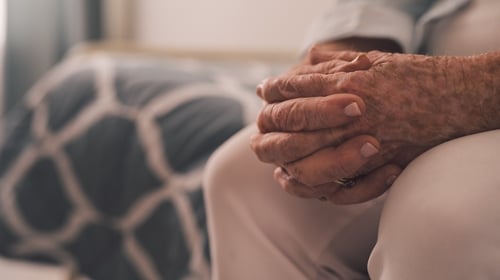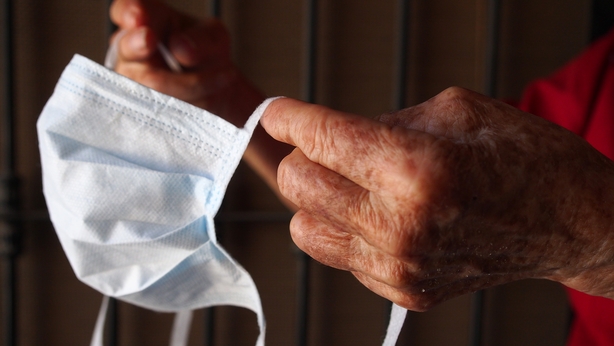
Patients discharged to nursing homes without test - NHI
by Ailbhe Conneely, https://www.facebook.com/rtenews/Nursing Homes Ireland will tell the Covid-19 committee tomorrow that hundreds of residents were discharged from hospitals to nursing homes without being tested for the virus.
There have been 264 clusters of Covid-19 in nursing homes to date, and 678 people with the virus have died.
The Special Oireachtas Committee on Covid-19 - in just its second public sitting - will tomorrow focus on what went wrong in the sector.
Nursing Homes Ireland will say that key State organisations left the nursing home sector and its residents "isolated" in the early days of Covid-19.
NHI will answer questions at the Special Oireachtas Committee on Covid -19 tomorrow.
In an opening statement seen by RTÉ News, NHI says the NTPF, the authority responsible for the commissioning of nursing home care, "fell silent" as homes incurred "considerable and responsible costs" to manage the pandemic.
The statement, which will be delivered by the CEO of Nursing Homes Ireland, says the dismay will "forever live" with the organisation, which he says was isolated "in those early days".
Tadgh Daly will point out that there was a knowledge that Covid-19 disproportionately affected older people and while multiple clusters initially emerged in hospitals, the numbers in nursing homes started to increase.
He will say the sector required a plan and Nursing Homes Ireland was "exasperated" because the focus and planning was placed "almost exclusively" on acute hospitals.
However, he welcomes Minister for Health Simon Harris's lead in bringing senior officials from the Department of Health and the HSE around the table.
This, he will say, has managed to curtail the prevalence of the virus in nursing homes.
Mr Daly will welcome the establishment of a nursing home expert panel to support good planning and safeguards to protect residents of nursing homes. However, he will point out that nurses working on the frontline in the homes are absent from that panel.
His opening statement, which he will deliver just after 11am tomorrow, concludes by saying that lessons can be learned from Covid-19 and that it must focus minds.
Mr Daly will say there is a requirement for a more integrated working relationship between the State and the nursing home sector.
Sinn Féin health spokesperson Louise O Reilly said: "The whole statement points to a complete failure of the State to enact a structural plan for the nursing home sector, with the necessary financial and staffing resources, until late in the day.
"The document makes for very difficult reading, but it highlights many of the issues that the sector itself had raised for many weeks before the Government intervened."
Meanwhile, the Health Information and Quality Authority will tell politicians on the committee that there is "no national clinical oversight of care being delivered to some of our most vulnerable citizens".
The State body, which aims to improve health and social care, will also say the the current model of residential care for older people has "no formal governance links with the Health Service Executive".
In his opening statement, the Chief Executive of HIQA Phelim Quinn will say that 80% of nursing homes are operated by private providers and the Health Service Executive did not know the sector when the pandemic hit.
He will say that the infrastructure required by the HSE to support the private sector was "under resourced" and became "increasingly challenged".
Mr Quinn will outline a number of challenges faced by private nursing homes regarding timely testing and results, access to sustainable levels of personal protective equipment (PPE) and base line staff numbers including senior nursing expertise in infection control.
He is expected to say that on 18 March, HIQA offered to assist the HSE in liaising with private nursing homes due to the fact that there was no established relationship.
Mr Quinn will say from 1 April, the organisation requested a more formal escalation pathway for a more strategic coordinated approach to: the supply of PPE, resident and staff testing results, a longer term approach to staffing and infection control advice.

He will add that: "HIQA believes that the quality and safety of our health and social care services would be greatly improved by a review of the current regulatory framework and the introduction of an accountability framework."
Meanwhile, a support and advocacy service for vulnerable adults will highlight the impact of the outbreak in nursing homes on residents and staff.
Executive Director of Sage Advocacy Mervyn Taylor, is expected to say that for many residents and for those with dementia the arrival of people in full PPE was terrifying.
He will say the serious shortages of staff meant that there was little, if any, time to provide support to residents in facilities where many died.
Mr Taylor will say that for families with relatives who were extremely ill or dying, the inability to visit or to even talk to their loved one by phone was a source of considerable distress and frustration.
Earlier, the Co-Executive Director of the NGO, Validity, said while nursing homes are the reality right now, they are not the best way to deal with older people in the community and are a violation of their human rights.
Speaking on RTÉ's Today with Sarah McInerney, Ann Campbell said there are alternatives such as providing services in the community for people to remain in their own homes.
Last week, Minister for Health Simon Harris announced that a Covid-19 nursing home expert panel would be established to ensure the best safeguards would be provided to the sector.
She said nursing homes fall into the category of congregate living and the Disability Rights Committee, which monitors the UN Disability Rights Convention has found that at its core, it is about choice and control. Do people have a choice about living there, or is it by default that there is no other viable alternative setting and once they are there, do they have control over their living environment; can they choose what time to have breakfast and can they come and go as they like, Ms Campbell asked.
She said many of these rights are being violated under international human rights law, and stated "if we're honest with ourselves no one wants to end up in a nursing home".
She said nursing homes tend to focus on healthcare needs, but these can often be met in the community.
"Ageing is not a health issue, ageing is a social issue," she added.
She said research shows that the health outcomes of people in institutions are worse than in the community.
In response, Chief Executive of Nursing Homes Ireland Tadhg Daly said he would not see it that way at all and said it is a "gross misrepresentation to suggest people don't have choice and control".
He said many people who reside in nursing homes applied under the Fair Deal scheme and were assessed to be appropriate for nursing home care.
He said: "Absolutely, they live in a congregated setting, but to suggest they don't have choice about their meal times, about the clothes they wear, or who they wish to have visit them is not representative of the nursing home sector that I represent."
He said many also have their own entrance to their particular unit.
Mr Daly added that he has written to several Health Ministers over the past ten years calling for a forum on long-term care and said it is time to have a "mature evidence-based debate on care of the older person".
Nursing homes are evolving and many provide residential care, many provide home care and some provide meals on wheels, he said.
He warned of the danger of an "either/or" mentality and said many people who come to nursing homes feel safe and secure and their life is enhanced.
He said around 3% of people over 65 reside in nursing homes.
Meanwhile, Professor of Geriatric Medicine at Tallaght University Hospital Des O'Neill said "there needs to be a re-think around this area" and there have been "serial policy failures here".
He said he would agree with Ms Campbell that the characteristics of choice and control "are not adequately filled out" and "could be filled out by various changes to nursing home design and systems such as the greenhouse alternative which is small, domestic units where you do have control, where you can get up and have your cup of tea in the morning and have your breakfast at the time you want rather than a set specific time".
There are limits around care in the community, and there comes a point when so many people start to come into your house that it starts to become very challenging, Prof O'Neill added.
He said this is an opportunity to "avoid all the policy mistakes we've made around nursing homes, about disconnecting them from the health services".
Additional reporting: Aisling Kenny